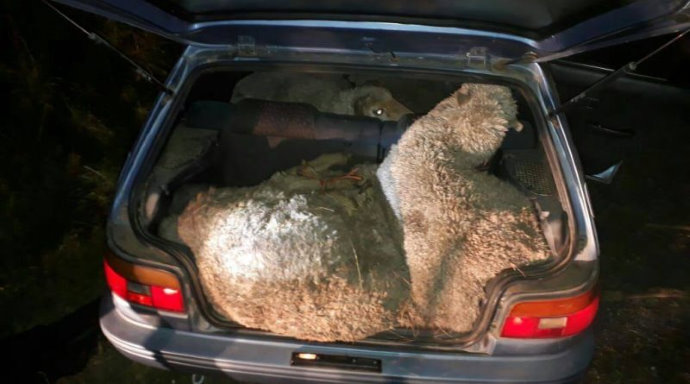Theft of Livestock and Road Safety
Most of South Africa’s land surface (69%) is suitable for grazing, and livestock farming is by far the largest agricultural sector in the country.
Livestock often presents a significant challenge to road users in our rural areas.
Criminals target the theft of livestock and show a disregard for the safety of others in the vicinity. They leave gates open or damage fences that offer an important barrier between animal life and road users!
Some of those animals are found roaming along provincial and national roads, thus leading to motor vehicle crashes.
These criminals usually operate during the dark of night and have also been involved in numerous rollover crashes with overloaded vehicles.
According to a Free State Agriculture impact study of commercial agriculture crimes in 2017, livestock losses in the Free State could amount up to as high as R3 billion a year.
Preventative Measures to keep Livestock Safe
- Livestock owners should ensure that all fences and gates are kept in good working order, to protect their livestock.
- Ensure that holes in and under fences are repaired immediately.
- Consider employing a specially trained employee to patrol the fences daily. This person can see to it that holes in and under fences are repaired at once.
- The property owner should not merely delegate but take charge and inspect reparations.
- Loading ramps in paddocks or on farms away from direct supervision should always be kept locked or obstructed.
- The yards or kraals where the stock is kept should be secured.
- In the planning of paddocks, the forming of corners next to roads should be avoided, as these are ideal for livestock to be driven into and for loading purposes.
- Sheep can be kept in a kraal close to the farmhouse
- If you consider buying an additional farm, remember: “absentee landlords gather no crops”.
- Consider buying close to your residential farm.
- Trends on regular occurrence of Stock Theft
- Keep an eye and ear on trends with regards to time and method of stock theft.
- Be particularly watchful when there is a full moon, over weekends and at the end or beginning of a month, or during periods that you know from experience when stock theft (slaughtering for the pot) occurs.
Employees and Stock theft
- If possible, appoint trained workers to patrol the fences daily.
- When considering applicants for employment, enquiries should be made at previous employers to establish the real reason why an employee had left his previous job.
- Enquiries should also be lodged at the SAPS to determine whether the applicant has a criminal record. Establish what kind of criminal record the applicant has.
- If employees at stock posts possess their own animals, a good preventative measure against stock theft (if the involvement of employees is suspected) is to allow the animals to mix and graze together.
- Employees should be trained to pay attention to irregularities. Ask your employees to be careful about what they say in the presence of strangers regarding activities on the farm.
- Careless talk can lead to livestock losses.
- Communication, Access Control and Visitors
- If your farm is on the country’s borders, do not get involved in illegal deals with citizens of neighbouring countries.
- It often happens that border livestock owners become involved with illegal trade with citizens of neighbouring countries in some or other way, such as the renting of grazing pastures.
- There are legal steps that must be taken in this regard, but if not taken, such actions can create the ideal climate for other crimes and stock theft.
- Know your neighbours!
- If you are going on leave or taking a trip to leave your phone numbers to your neighbours so that they can report any irregular things happening at your farm.
- Report immediately to your stock theft unit when animal speculators and hide bone buyers or livestock dealers from neighbouring countries are active in your area.
- Keep proper record of all prospective livestock buyers as soon as you enter negotiations.
- The necessity of a thorough stock register cannot be emphasised enough. Commit to paper as many details as possible and keep the register up to date yourself.
- Do not allow loitering on the farm or any idle and unemployed people to settle on your property.
- Strangers entering the farm or visiting farmworkers should first obtain your permission – implement a visitor control system, wherein all particulars of visitors to the farm are noted, whom they are visiting and when they are leaving.
Counting and Identification of Animals
- Livestock owners should count livestock at stock posts at least once a week.
- The livestock owner must count the animals him/herself and cannot leave it to his/her employees to do the counting or to lodge any complaints.
- Many court cases are lost as a result of disputes about the proper identification of animals.
- If an animal is marked with a registered brand mark or tattoo, disputes will be avoided.
- Brand your stock! Go to Stock Theft Unit offices where you will be issued with application forms and apply for branding certificates to the Department of Agriculture
- Employees should properly mark their livestock, according to the Animal Identification Act, 2002 (Act No 6 of 2002), preferably by branding them.
- Also, check up upon your employees’ livestock.
- Avoid any routine, especially at stock posts, as your employees may be informers to stock thieves.
- Shortages and signs indicating possible thefts should immediately be reported.
- Do not merely dump stock whilst at the grazing field – rather watch the stock
Technology and Preventing Stock Theft
Farmers are advised to invest in technology such as CCTV cameras to curb the rise in stock theft.
Agricultural Unions are actively engaging with security specialists to reduce the cost of setting up cameras in rural areas.
Owners of livestock are encouraged to make use of helplines created through cooperation between SAPS and the Agriculture Industry.
Thermal imaging cameras are gaining in popularity in South Africa as they become more affordable and the number of useful applications is going up.
Thermal imaging cameras record images of the infra-red radiation (heat) being emitted by the skin to determine threats.
The image produced by these cameras consists of a range of colours, with hotter areas represented in red, cooler areas appearing in blue and lukewarm areas in orange or yellow, for instance.
These cameras have several advantages over conventional CCTV security cameras including being able to detect threats in extremely low light (or even complete darkness), and during unfavourable weather conditions like heavy fog, dust, excessive glare from the sun, or thick vegetation in the area being surveyed.
In addition, thermal cameras provide a much clearer image compared to conventional imaging solutions and have a considerably longer threat detection range when compared to lower resolution surveillance cameras that make use of conventional optics.
Game rangers are using thermal imaging camera solutions to assist them in their attempts to catch rhino poachers.
Reporting and Community Cooperation
- Ensure that stolen stock cannot be hidden on your farm.
- Stock posts serve as ideal overnight stopovers to hide stolen livestock.
- If you notice strange animals or suspicious persons at a cattle post, report it to the SAPS and your neighbours immediately
- The longer the delay, the less the possibility of stolen stock being recovered.
- Cooperate with the local South African Police Service and Stock Theft Unit, do not work against them. Please support them in their efforts to help you.
- Community members should work together in the fight against so it can be easy for them to raise alarm in assisting each other to prohibit the perpetrators to take away their stock.
- Make your safety a priority and do not engage/resist in cases where stock is taken during the night at gunpoint.
- It often happens that stock theft cases must be withdrawn due to a lack of interest or reluctance shown by some complainants to attend court proceedings.
- Show interest and attend all court cases.
Agriculture Insurance and Livestock
- Farmers are advised to consider the risks to their livestock and the protection they may gain from the insurance of livestock.
- “All Risks” insurance may be too costly for many farmers and it could make financial sense to insure these risks on a “Specified Perils” basis
- Insurance on an All Risks of Mortality basis will cover livestock for death caused by most perils, including sickness, disease, accidental death, fire, lightning, poaching, territorial fighting and so on, but it can be costly.
- Most farmers and ranchers only take it out for very special animals, such as a highly valuable breeding bull.
- It is recommended that the owner of the livestock contact an insurance consultant to discuss the specific needs and gain insurance advice.
Source: https://www.arrivealive.mobi/rural-safety-and-preventing-stock-theft
Views: 4

